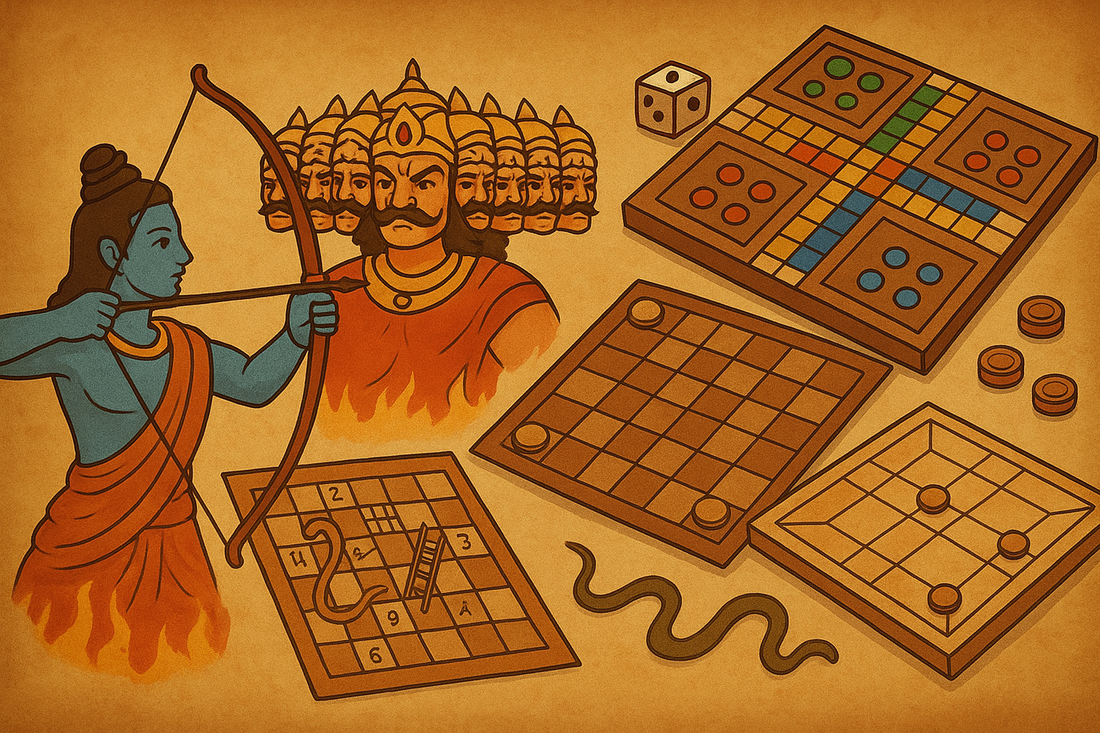
The Ancient History of Dasara & Traditional Indian Board Games
Share
Check Out All The Handcrafted Indian Traditional Board Games Here
Dasara, also celebrated as Vijayadashami, holds an incredibly rich history dating back thousands of years. This festival marks the victory of good over evil with roots deeply embedded in ancient Hindu scriptures, mythologies, and royal traditions. As we celebrate Dasara Festival 2025 from September 22 to October 2, understanding the historical significance of both the festival and traditional Indian board games reveals the profound cultural wisdom passed down through generations.
The Historical Roots of Dasara
The origins of Dasara can be traced to ancient Hindu texts, particularly the Ramayana, which chronicles Lord Rama's victory over the ten-headed demon king Ravana. In Karnataka, the festival commemorates Goddess Chamundeshwari's triumph over the buffalo demon Mahishasura, giving Mysore (originally Mahishur) its name and significance.
Historical records from the Vijayanagara Empire (14th-15th centuries) reveal grand celebrations called "Mahanavami," which honored warriors and divine feminine power. The Italian traveler Niccolò de' Conti documented these festivities as magnificent religious and martial events featuring athletic competitions, cultural performances, and charitable giving.
The Wodeyar dynasty of Mysore continued this tradition, with Raja Wodeyar I officially establishing the royal Dasara celebration in 1610 at Srirangapatna. The festival evolved into the spectacular Mysore Dasara we witness today, complete with illuminated palaces, elephant processions, and cultural exhibitions.
Origins of Ancient Indian Board Games
Traditional Indian board games share an equally ancient heritage, with archaeological evidence from the Indus Valley Civilization (3300-1300 BCE) revealing dice and game boards. These games weren't merely entertainment—they served as educational tools, social connectors, and vehicles for spiritual insights.
Pachisi/Chausar: The Royal Game
Dating back to 300 BCE, Pachisi (known as Chausar in its more complex form) was mentioned in the Mahabharata under the name "Pasha". Emperor Akbar famously played this game on a massive court with living pieces—young slaves from his harem representing the tokens.
Chaturanga: The Chess Ancestor
This ancient strategy game, originating around the 6th century, evolved into modern chess as it traveled westward. Chaturanga taught military strategy and was particularly favored by the Kshatriya warrior caste.
Ashtapada: The Eight-Square Game
Played on an eight-by-eight board with special "castle" markings, Ashtapada likely influenced the development of Chaturanga and later chess variants.
Snakes and Ladders (Moksha Patam)
Originally called Moksha Patam, this game was designed to teach moral lessons about karma and dharma—ladders representing virtues and snakes symbolizing vices, perfectly aligning with Dasara's theme of good conquering evil.
Cultural and Spiritual Significance
Ancient Indian games were deeply intertwined with philosophical teachings and spiritual practices. They served multiple purposes:
- Educational Tools: Teaching strategy, mathematics, and moral values
- Social Connectors: Strengthening community bonds across all social classes
- Physical and Mental Training: Developing cognitive skills and strategic thinking
- Spiritual Insights: Incorporating concepts of karma, dharma, and life's transient nature
The tradition of playing board games during festivals like Dasara symbolically enacts the eternal battle between good and evil, wisdom and ignorance—themes central to the festival's celebration.
The Royal Connection
Royal courts across India elevated these games to art forms. Archaeological evidence from Ellora caves shows Pachisi boards carved into rock, while Mysore Palace traditions included elaborate game sessions during Dasara celebrations. The connection between royalty and gaming reinforced the strategic and educational value of these ancient pastimes.
Expert Insights
"The legacy of Dasara festival and traditional Indian games reminds us that festivals were designed as holistic experiences encompassing spirituality, strategy, communal harmony, and entertainment. These games carry the DNA of our civilization."
— Prof. Anjali Rajan, Historian of Indian Cultural Traditions
"Ancient Indian board games are timeless treasures that continue to offer mental stimulation and communal joy, perfectly fitting the themes of Dasara. They represent a sophisticated understanding of learning through play."
— Dr. Manoj Kulkarni, Cultural Anthropologist
"The historical continuity between Dasara celebrations and traditional gaming practices shows how our ancestors integrated wisdom, entertainment, and cultural transmission into unified experiences."
— Team Roll the Dice
Preserving Ancient Wisdom Today
The historical connection between Dasara and traditional games remains relevant in 2025. As families gather to celebrate the festival, playing these ancient games connects us to our cultural roots while providing screen-free entertainment that builds bonds and develops cognitive skills.
Celebrate History with Roll the Dice
Roll the Dice offers a carefully curated collection of traditional Indian board games that echo centuries of heritage. Our authentic reproductions of Chausar, Chowka Bara, Ashtapada, and other classical games allow modern families to experience the same strategic enjoyment that entertained ancient royalty and common folk alike.
This Dasara Festival 2025, reconnect with history through games that have survived millennia—games that continue to teach patience, strategy, and the eternal truth that wisdom and virtue ultimately triumph over ignorance and vice.
